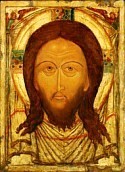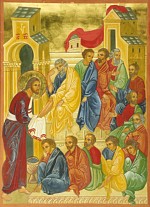|

First
Reading Psalmody Second
Reading Reading
of the Gospel Homily
|
Homily
"I have eagerly desired to eat this Passover with you" (Lk 22:15), said Jesus to his disciples on that Thursday evening when, together with all Jews - as we have heard in the book of Exodus - they commemorated the night preceding the passage through the Red Sea. He repeats those same words to us tonight. In effect, it is as if the heart of this celebration is marked by God's desire to eat the Passover supper with his friends, of that time and of today. This longing is so present as to be tangible. We might say that Jesus wishes to make himself our contemporary, to be among us tonight. And if we are here, we are showing in some way our own longing to be with him, to be included among his disciples. This desire must always energize us. But tonight it has a unique value and a unique flavor: it is the last day of Jesus' earthly life, his last evening. And he is barely thirty-three years old. In twenty-four hours we will find him wrapped in a sheet, inside a tomb. Our being near him is a great comfort to him.
There are two gestures at the center of the Passover that Jesus celebrates with his loved ones. The first, told by the Gospel according to John, is the washing of the feet. In the fourth Gospel, this scene seems to take the place of the institution of the Eucharist, almost as if to illustrate a special parallel. As the evangelist tells it, Jesus, at a certain point during the supper, got up from the table, took off his outer garments, and, taking a towel, knelt before each disciple, including Judas, and washed their feet. They were all embarrassed. But Jesus told them, "Do you realize what I have done for you? You call me Oteacher' and Omaster,' and rightly so, for indeed I am. If I, therefore, the master and teacher, have washed your feet, you ought to wash one another's feet. I have given you a model to follow, so that as I have done for you, you should also do" (Jn 13:12-15). In the liturgy of the Church it is prescribed that this gesture should be repeated, at least symbolically, to signify to the letter the application of the Gospel. The Gospel command is directed to all of the disciples, even if in the liturgical rite only the priest bends down to wash feet. It is obvious that an external gesture is not the point; what the Gospel is asking for is a life attitude, a style of service and humility in reaching out to one's brothers and sisters. While the world urges us and teaches us to stand up straight, the Lord offers us a contrasting example. The meaning of this gesture is clarified well by Jesus: "I give you a new commandment: love one another. As I have loved you, so you also should love one another" (Jn 13:34). Well, if there are men and women who lower themselves to wash one another's feet, if there are people who lean over those who need friendship, love, understanding, welcome, and help, the presence of the Lord will be real and visible in this world of ours.
But Jesus, on that evening, did not only lean over our feet, he also turned himself into our food. The sacrament of bread and wine reveals the extent of the Lord's love for us. As Paul says in the first letter to the Corinthians, "On the night before he was handed over, he took bread, and after he had given thanks, broke it and said, OThis is my body that is for you'; in the same way also the cup, saying, OThis cup is the new covenant in my blood'" (11:23-24). A greater invention, staying together with his disciples of all times, would be hard to find! We might call the Eucharist the miracle of love. Jesus has truly done the impossible in order to stay near us. But how is Jesus present in the bread and the wine? I would say that he is not present in just any way: he is present as "broken" bread and "poured out" cup, or as one who gives himself completely, who is broken and pours out all his blood for us. He is present as a friend who loves until the end, without sparing anything of himself: "He loved his own in the world and he loved them to the end" (Jn 13:1). And how he loved them! He had chosen them, healed them, grown them, defended them...in the Garden of Gethsemane - we will soon accompany him there - when the mob is about to seize him, he tells them, "If you are looking for me, let these men go" (18:8). He did not want them to risk any danger. What love!
With the Eucharist, this love not only approaches us in order to remain with us, it enters and becomes flesh of our flesh. Let us reach out to the bread of life and the cup of salvation, and we will be transformed! That host and that cup are the visible signs of a love without limit. That host and that cup, the presence of a broken body and a poured out blood, are a shock to our care for ourselves, our worries over our body, our tenacity in sparing ourselves in every way. The Eucharist is truly a sacrament of salvation: it saves us from a life of self-obsession and transforms us into men and women who know how to kneel before the poor and the weak, thus making real and true the love of God.
|

|
